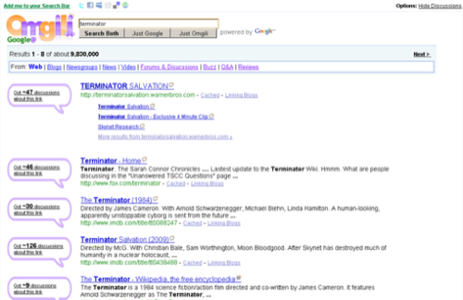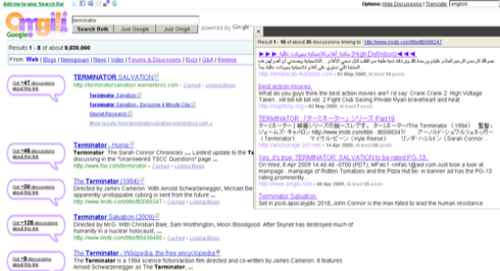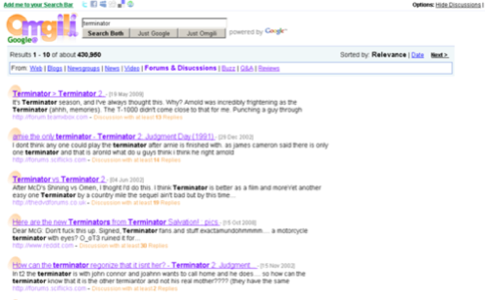Omgili, which we reviewed in 2007 as a top alt search engine, has focused on culling results from the weird corners of the web: Forums, boards, discussion groups – basically, anywhere you’d find purely or mostly subjective information. It’s the polar opposite of Google search, which is practically a peer-reviewed journal by comparison.

Their latest release, Google@Omgili, features a sweet mashup with Google search, giving users a well-rounded look at the fair-and-balanced web alongside social buzz from and about sources such as blogs, newsgroups, video-sharing sites, forums, discussion boards, Q&A sites, and review sites.
“We mashed the familiar Google interface (and excellent results) and added many unobtrusive useful features on top,” wrote CEO, Ran Geva, in an email yesterday. “The interface is not crowded by results from more resources. Instead, it offers you a deeper insight about your search query with a click.”
The translation function isn’t amazing, but for trending or hot-button topics, the results can be quite interesting.
The basic Google@Omgili search yields traditional web results with discussions that link to each result:

Once a user clicks on the “discussion bubble” next to the link, he can preview some of the social chatter linking back to that particular result:

Users can also choose to refine the search to show results from, say, forums and discussions only:

This product also incorporates the True Knowledge API and integrates Snap.com‘s service to give users a snapshot and video/RSS/Wikipedia previews. And of course, users can choose any number of social sites to share Google@Omgili with their networks (but not to share specific search results, which is disappointing) and can choose to add Google@Omgili to their search bar.
[UPDATE: The day after this post was published, Geva emailed us to report his team had added sharing of the results page on social networks. “We love feedback!” he wrote.]Although the original Omgili search offering calls to mind many, many social/forum search engines – most of which have financially struggled or failed, see Twing and Delver – the Google mash gives this engine a much more interesting and useful product.
Overall, it’s a nice way to see which links are generating (or supporting) subjective online conversations and might be a good tool for tracking down topic experts or sources. On the other hand, it might also be a way to get mired down in the chatter from forum crazies. Six of one, a half dozen of the other – after all, whether you’re brilliantly insane or insanely brilliant, you’ve got to post your theories and rants somewhere, right?

















